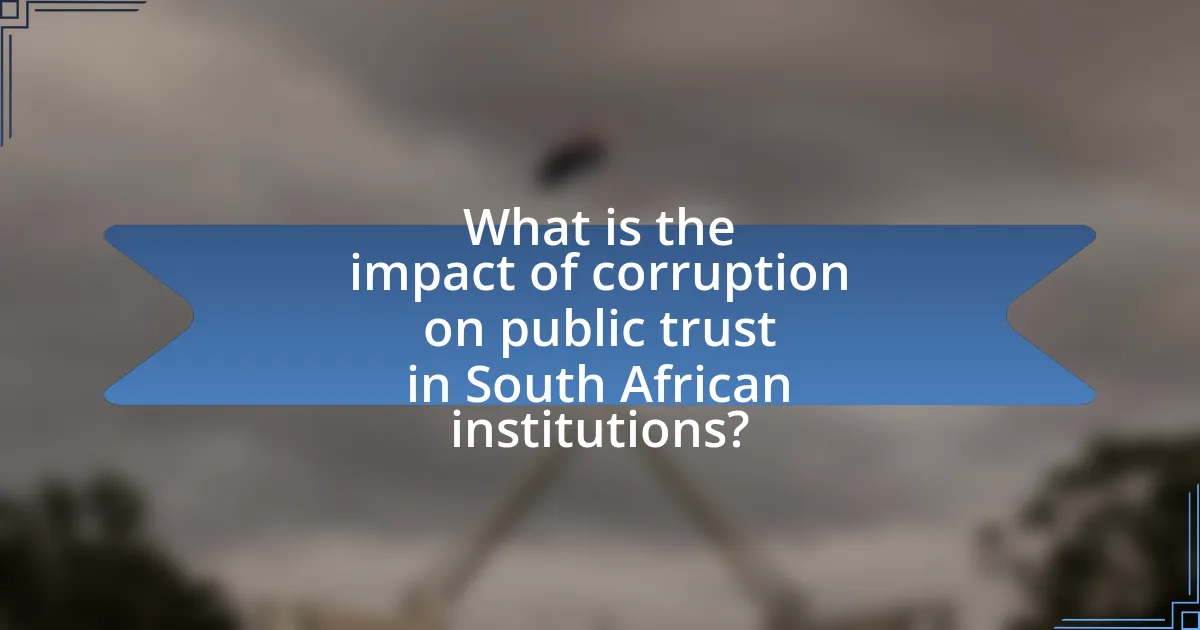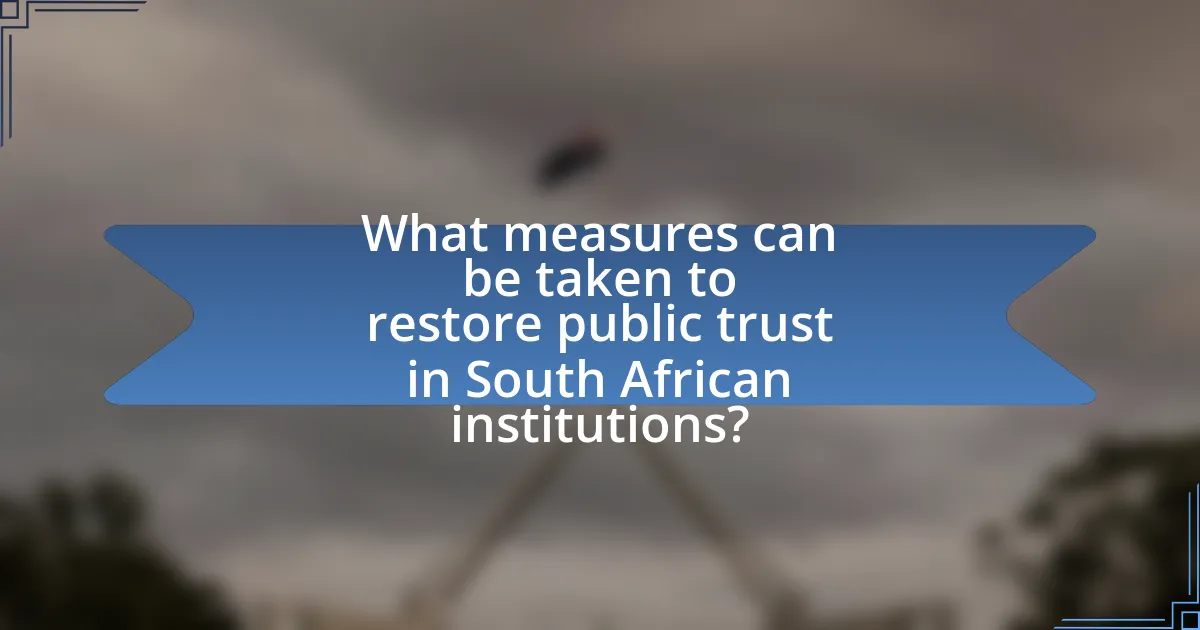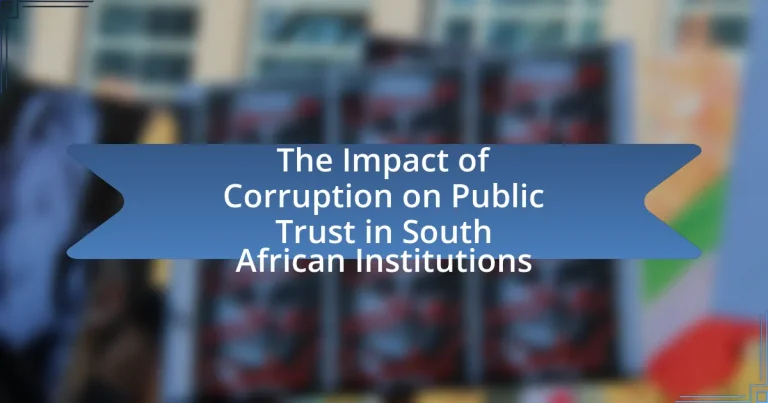The article examines the impact of corruption on public trust in South African institutions, highlighting how perceived corruption diminishes citizens’ confidence in government and public services. It details various manifestations of corruption, including bribery, nepotism, and misappropriation of funds, and discusses their detrimental effects on institutional integrity and service quality. The article emphasizes the importance of public trust for effective governance and civic engagement, while also exploring demographic differences in perceptions of corruption. Finally, it outlines strategies for restoring trust, such as enhancing transparency, accountability, and community engagement, drawing lessons from successful anti-corruption efforts globally.

What is the impact of corruption on public trust in South African institutions?
Corruption significantly undermines public trust in South African institutions. When citizens perceive corruption within government and public services, their confidence in these institutions diminishes, leading to skepticism about their effectiveness and integrity. For instance, the 2021 South African Social Attitudes Survey indicated that only 29% of respondents trusted the national government, a decline attributed to widespread corruption scandals, such as those involving state capture and mismanagement of public funds. This erosion of trust can result in decreased civic engagement and compliance with laws, further destabilizing the relationship between the public and its institutions.
How does corruption manifest in South African institutions?
Corruption in South African institutions manifests primarily through bribery, nepotism, and misappropriation of public funds. Bribery occurs when officials accept illicit payments in exchange for favorable treatment or services, undermining the integrity of public services. Nepotism is prevalent when government officials favor relatives or friends in hiring or contracting processes, leading to inefficiency and a lack of accountability. Misappropriation of public funds is evidenced by numerous scandals, such as the misuse of state resources for personal gain, which has been highlighted in reports like the Public Protector’s findings on the state capture inquiry. These manifestations erode public trust, as citizens perceive institutions as corrupt and unresponsive to their needs.
What are the common forms of corruption observed in these institutions?
Common forms of corruption observed in South African institutions include bribery, nepotism, fraud, and embezzlement. Bribery often manifests as public officials accepting payments in exchange for favorable treatment or services, undermining the integrity of public service. Nepotism involves the preferential treatment of relatives or friends in hiring or contracting processes, which compromises meritocracy. Fraud is prevalent in the misrepresentation of information or misuse of resources for personal gain, while embezzlement refers to the misappropriation of funds entrusted to an individual’s care, significantly impacting public trust. According to the 2021 Corruption Perceptions Index by Transparency International, South Africa scored 41 out of 100, indicating a high level of perceived corruption in public institutions, which further illustrates the prevalence of these corrupt practices.
How do these forms of corruption affect institutional integrity?
Forms of corruption significantly undermine institutional integrity by eroding trust and accountability within public institutions. When corruption occurs, it leads to a perception that decisions are made based on personal gain rather than public interest, which diminishes the legitimacy of institutions. For instance, a study by Transparency International indicates that countries with high levels of corruption experience a marked decline in public trust, as citizens feel their needs are secondary to corrupt practices. This erosion of trust can result in decreased civic engagement and compliance with laws, further weakening institutional frameworks.
Why is public trust important for South African institutions?
Public trust is crucial for South African institutions because it underpins the legitimacy and effectiveness of governance. When citizens trust their institutions, they are more likely to engage with them, comply with laws, and support public policies. According to a 2021 survey by the Afrobarometer, only 30% of South Africans expressed trust in their government, highlighting a significant gap that can hinder institutional performance and social cohesion. This lack of trust can lead to decreased public participation and increased skepticism towards government initiatives, ultimately exacerbating issues like corruption and inefficiency within these institutions.
What role does public trust play in governance and service delivery?
Public trust is essential in governance and service delivery as it fosters cooperation between citizens and government institutions. When the public trusts their government, they are more likely to engage with services, comply with regulations, and support policies, leading to effective governance. For instance, a study by the World Bank indicates that higher levels of public trust correlate with improved service delivery outcomes, as citizens are more willing to participate in community programs and provide feedback. Conversely, a lack of trust can result in disengagement, reduced compliance, and increased skepticism towards government actions, ultimately undermining the effectiveness of governance and service delivery.
How does a lack of public trust influence citizen engagement?
A lack of public trust significantly decreases citizen engagement. When citizens perceive their institutions as corrupt or untrustworthy, they are less likely to participate in civic activities such as voting, attending public meetings, or engaging in community initiatives. Research indicates that in South Africa, where corruption has been prevalent, public trust in government institutions has declined, leading to lower voter turnout rates; for instance, the 2019 national elections saw a turnout of only 66.5%, down from 73% in 2014. This decline in engagement can perpetuate a cycle of disillusionment, further eroding trust and diminishing the effectiveness of democratic processes.
What are the consequences of corruption on public trust?
Corruption significantly undermines public trust in institutions. When citizens perceive corruption, they often believe that officials prioritize personal gain over public service, leading to disillusionment and skepticism towards government actions. According to a 2020 Transparency International report, countries with high corruption levels experience a marked decline in public confidence, with 70% of respondents in South Africa expressing distrust in their government. This erosion of trust can result in decreased civic engagement, lower compliance with laws, and diminished effectiveness of public policies, ultimately destabilizing the social contract between citizens and their government.
How does corruption erode trust in government officials?
Corruption erodes trust in government officials by creating a perception of dishonesty and self-interest among public servants. When officials engage in corrupt practices, such as bribery or embezzlement, it undermines their credibility and the integrity of the institutions they represent. Research indicates that in South Africa, public trust in government has significantly declined due to high-profile corruption scandals, such as the state capture allegations involving former President Jacob Zuma, which led to a 2017 survey showing that only 29% of South Africans trusted their government. This decline in trust results in decreased public engagement and compliance with government initiatives, further perpetuating a cycle of distrust and disillusionment.
What impact does corruption have on public perception of service quality?
Corruption significantly undermines public perception of service quality. When citizens perceive corruption within institutions, they often believe that services are substandard, inefficient, or unfairly distributed. Research conducted by the South African Institute of Race Relations indicates that 70% of South Africans feel that corruption negatively affects the quality of public services, leading to a lack of trust in government institutions. This perception is reinforced by high-profile corruption scandals, which create a narrative that services are compromised by unethical practices, further diminishing public confidence in the effectiveness and integrity of those services.

How does corruption affect different sectors in South Africa?
Corruption significantly undermines various sectors in South Africa, leading to inefficiencies and loss of public trust. In the public sector, corruption results in misallocation of resources, with funds intended for essential services like healthcare and education being siphoned off, as evidenced by the 2019 report from the Auditor-General, which revealed that R51 billion was lost to irregular expenditure. In the private sector, corruption distorts competition, discouraging investment and innovation, as companies may resort to bribery to secure contracts, which was highlighted in the 2020 Corruption Perceptions Index by Transparency International, where South Africa scored 41 out of 100. The impact on law enforcement is also profound, as corruption erodes the integrity of police services, leading to a lack of accountability and increased crime rates, as reported by the South African Police Service in their annual crime statistics. Overall, corruption creates a cycle of distrust, affecting governance and societal stability across multiple sectors.
What sectors are most affected by corruption in South Africa?
The sectors most affected by corruption in South Africa include public procurement, law enforcement, and healthcare. Public procurement is particularly vulnerable, with the Auditor-General reporting significant irregularities and mismanagement of funds, leading to a loss of billions in taxpayer money. Law enforcement agencies, such as the police, have faced allegations of bribery and misconduct, undermining public trust in their ability to maintain safety and justice. The healthcare sector has also been impacted, with reports of fraud and corruption in the distribution of medical supplies and services, further eroding confidence in public health institutions.
How does corruption impact the healthcare sector?
Corruption significantly undermines the healthcare sector by diverting resources away from essential services and eroding public trust. In South Africa, for instance, it has been reported that corruption leads to the misallocation of funds, resulting in inadequate medical supplies and poor infrastructure. A study by the South African Medical Journal found that corruption in healthcare can increase mortality rates due to the lack of access to necessary treatments and medications. Furthermore, public trust diminishes as citizens perceive healthcare institutions as corrupt, leading to decreased utilization of services and a reluctance to seek medical help. This cycle perpetuates a decline in overall health outcomes and exacerbates inequalities within the healthcare system.
What are the effects of corruption on education institutions?
Corruption negatively impacts education institutions by undermining their integrity and effectiveness. It leads to misallocation of resources, resulting in inadequate facilities, poorly trained staff, and substandard educational materials. For instance, a study by the South African Council of Educators found that corruption in procurement processes often results in inflated prices for educational supplies, diverting funds away from essential services. Additionally, corruption fosters a culture of distrust among students, parents, and educators, which can diminish student motivation and engagement. This erosion of trust ultimately hampers the overall quality of education and the development of human capital in society.
How do different demographics perceive corruption and its impact on trust?
Different demographics perceive corruption and its impact on trust variably, influenced by factors such as age, education, and socioeconomic status. For instance, younger individuals often exhibit a higher level of distrust towards institutions perceived as corrupt, as evidenced by a 2021 survey from Transparency International, which indicated that 70% of respondents aged 18-24 believed corruption was a significant barrier to effective governance. In contrast, older demographics may have a more resigned view, often believing that corruption is an inherent part of political systems, which can lead to lower expectations of institutional integrity. Additionally, individuals with higher education levels tend to be more critical of corruption and its effects on trust, as shown in a study by the Institute for Justice and Reconciliation, where educated respondents were more likely to demand accountability from public officials. Socioeconomic status also plays a role; lower-income groups often feel more directly affected by corruption, leading to a pervasive sense of betrayal and diminished trust in public institutions.
What differences exist in perceptions of corruption among various age groups?
Perceptions of corruption vary significantly among different age groups, with younger individuals generally viewing corruption as more pervasive and detrimental compared to older generations. Research indicates that younger people, particularly those aged 18-24, are more likely to express distrust in government institutions and perceive higher levels of corruption, influenced by their exposure to social media and global perspectives on governance. In contrast, older age groups, such as those over 50, often exhibit a more resigned attitude towards corruption, viewing it as a longstanding issue that is less likely to change. This divergence in perception is supported by surveys conducted by Transparency International, which show that younger respondents consistently report higher levels of concern regarding corruption’s impact on society and governance.
How do socio-economic factors influence trust in institutions?
Socio-economic factors significantly influence trust in institutions by shaping individuals’ perceptions and experiences with governance and public services. For instance, higher income levels and education often correlate with increased trust, as individuals with better socio-economic status tend to have more positive interactions with institutions and greater access to information. Conversely, lower socio-economic status can lead to disenchantment and skepticism towards institutions, particularly if individuals perceive corruption or inefficiency in public services. Research indicates that in South Africa, communities with higher poverty rates exhibit lower trust in governmental institutions, as evidenced by the 2021 Afrobarometer survey, which found that only 34% of South Africans expressed trust in their government, with trust levels significantly lower in economically disadvantaged areas.

What measures can be taken to restore public trust in South African institutions?
To restore public trust in South African institutions, implementing transparent governance practices is essential. This includes establishing independent oversight bodies to monitor government actions and expenditures, thereby ensuring accountability. For instance, the establishment of the Public Protector’s office has been a step towards enhancing transparency, but further strengthening its powers and independence could significantly improve public confidence. Additionally, engaging citizens in decision-making processes through public consultations can foster a sense of ownership and trust. Research indicates that countries with higher levels of civic engagement tend to have stronger public trust in institutions. Therefore, enhancing transparency, accountability, and citizen participation are critical measures to rebuild trust in South African institutions.
What strategies can be implemented to combat corruption?
To combat corruption, implementing transparency measures, strengthening legal frameworks, and promoting civic engagement are essential strategies. Transparency measures, such as open government initiatives and public access to information, can reduce opportunities for corrupt practices by allowing citizens to scrutinize government actions. Strengthening legal frameworks involves enforcing anti-corruption laws and ensuring that there are severe penalties for corrupt activities, which can deter potential offenders. Promoting civic engagement encourages citizens to participate in governance and hold officials accountable, fostering a culture of integrity. For instance, the 2016 Corruption Perceptions Index by Transparency International highlights that countries with higher levels of civic engagement tend to report lower levels of corruption.
How can transparency and accountability be enhanced in institutions?
Transparency and accountability in institutions can be enhanced through the implementation of robust governance frameworks and the adoption of technology for open data initiatives. Establishing clear policies that mandate regular reporting and audits ensures that institutions are held accountable for their actions. For instance, the South African government has made strides in promoting transparency by enacting the Promotion of Access to Information Act, which allows citizens to request information from public bodies. Additionally, utilizing digital platforms for real-time data sharing can foster public engagement and scrutiny, thereby increasing institutional accountability. Research indicates that transparency measures can significantly improve public trust, as seen in various global studies linking open governance to reduced corruption levels.
What role do civil society and media play in fighting corruption?
Civil society and media play a crucial role in fighting corruption by promoting transparency, accountability, and public awareness. Civil society organizations often engage in advocacy, monitoring government actions, and mobilizing citizens to demand integrity from public officials. For instance, organizations like Corruption Watch in South Africa actively collect reports of corruption and provide legal support to whistleblowers, thereby empowering citizens to take action against corrupt practices.
Media serves as a watchdog by investigating and exposing corruption, which informs the public and holds officials accountable. Investigative journalism has led to significant revelations, such as the GuptaLeaks scandal, which uncovered extensive corruption involving high-ranking officials in South Africa. This type of reporting not only raises awareness but also pressures authorities to act against corruption. Together, civil society and media create a framework that fosters a culture of accountability, ultimately enhancing public trust in institutions.
What best practices can be adopted to rebuild public trust?
To rebuild public trust, institutions must prioritize transparency, accountability, and community engagement. Transparency involves openly sharing information about decision-making processes and financial transactions, which can be supported by implementing regular audits and public reporting. Accountability requires establishing clear consequences for unethical behavior, as seen in successful anti-corruption initiatives in countries like Singapore, where strict enforcement of laws has led to increased public confidence. Community engagement fosters trust by involving citizens in governance, allowing them to voice concerns and participate in decision-making, as demonstrated by participatory budgeting practices in various municipalities worldwide. These best practices collectively contribute to restoring faith in institutions by demonstrating commitment to ethical governance and responsiveness to public needs.
How can community engagement initiatives foster trust in institutions?
Community engagement initiatives can foster trust in institutions by promoting transparency and accountability. When institutions actively involve community members in decision-making processes, they demonstrate a commitment to listening and responding to public concerns. For example, participatory budgeting in various municipalities has shown that when citizens have a say in how funds are allocated, it leads to increased satisfaction with local governance and a stronger belief in the integrity of those institutions. Research by the World Bank indicates that such initiatives can reduce perceptions of corruption, as communities feel more empowered and informed about institutional actions. This empowerment fosters a sense of ownership and responsibility, further enhancing trust in the institutions that serve them.
What lessons can be learned from successful anti-corruption efforts globally?
Successful anti-corruption efforts globally demonstrate that transparency, accountability, and citizen engagement are crucial for reducing corruption. For instance, countries like Denmark and New Zealand consistently rank high on the Corruption Perceptions Index due to their strong institutional frameworks that promote transparency in government operations and decision-making processes. These nations implement rigorous auditing practices and encourage public participation in governance, which fosters trust and deters corrupt practices. Furthermore, the establishment of independent anti-corruption agencies, as seen in Singapore, has proven effective in investigating and prosecuting corruption cases, thereby reinforcing the rule of law and public confidence in institutions.
What practical steps can citizens take to hold institutions accountable?
Citizens can hold institutions accountable by actively participating in governance processes, such as attending public meetings and engaging in community forums. This participation allows citizens to voice concerns and demand transparency from officials. Additionally, citizens can utilize legal mechanisms, such as filing complaints or lawsuits against institutions that violate laws or regulations, thereby enforcing accountability.
Moreover, citizens can leverage social media and traditional media to raise awareness about corruption and institutional failures, mobilizing public opinion and pressuring institutions to act responsibly. Research indicates that public engagement in governance leads to increased accountability; for instance, a study by the World Bank found that citizen participation in oversight mechanisms significantly reduces corruption levels. By taking these steps, citizens can effectively influence institutional behavior and promote greater accountability.


